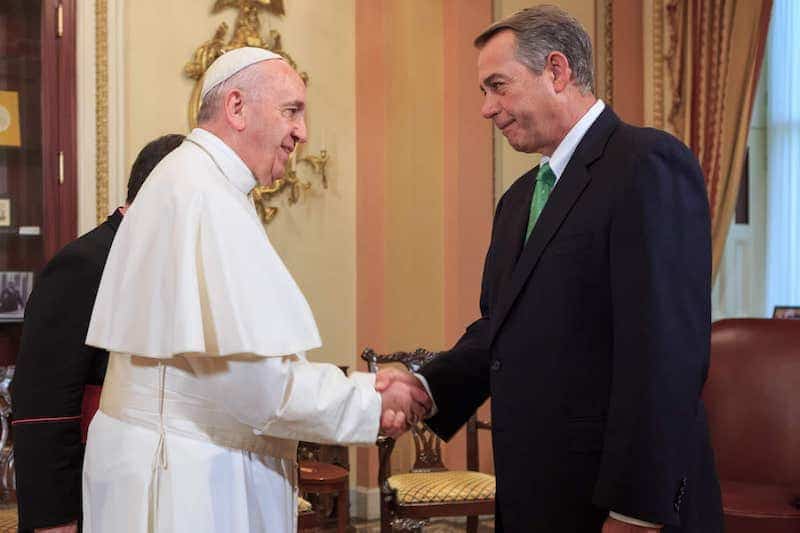Catholic Social Teaching and Politics
The Right to Life
The Right to Live in a Moral Environment
The Right to Live in a United Family
The Right to Religious Freedom
The Right to Freely Establish a Family
The Right to Work
The Right to Develop One’s Intelligence and Freedom
“The church does not have technical solutions to offer and does not claim ‘to interfere in any way in the politics of states’.” (Populorum Progressio, 13)
“The Church wishes to help form consciences in political life and to stimulate greater insight into the authentic requirements of justice as well as greater readiness to act accordingly.”

Is There a “Recommended” Form of Government?
Since Pope Leo XIII’s Rerum Novarum in 1891, the Church “presents the organization of society according to three powers – legislative, executive and judicial”; Pope St. John Paul II notes that this “represented a novelty in Church teaching” at the time.” (Centesimus Annus, 44)
Pope St. John Paul II went on to state that: “To that end, it is preferable that each power be balanced by other powers and by other spheres of responsibility which keep it within proper bounds. This is the principle of the ‘rule of law’, in which the law is sovereign, and not the arbitrary will of individuals.” (Centesimus Annus, 44) This sounds very familiar to American ears.
The Endorsement of Democracy
Traditionally, the Church has affirmed different forms of government (monarchy, oligarchy, democracy). The key issue for the Church is not the form of government but, rather, whether the government is working for the common good.
The Church now gives a preference for democracy because it permits society to collaborate more actively towards the common good. Pope Benedict XVI even called ‘democracy’ “the most valid historical instrument” for advancing human rights and development. He went on to say democracy has proven to be an effective means of “guaranteeing the future in a way worthy of man”. (Address to Members of The Centesimus Annus Foundation)
READ MORE
Perhaps the earliest ‘endorsement of Democracy came in Pope Pius XII’s 1944 Christmas radio address where he said, “in our day when the activity of the state is so vast and decisive, the democratic form of government appears to many as a postulate of nature imposed by reason itself.” (Section I)
Pope Pius XII went on to describe the necessary relationship between truth and freedom: “If the future is to belong to democracy, an essential part in its achievement will have to belong to the religion of Christ and to the Church, the messenger of our Redeemer’s word which is to continue His mission of saving men. For she teaches and defends supernatural truths and communicates the supernatural helps of grace in order to actuate the divinely-established order of beings and ends which is the ultimate foundation and directive norm of every democracy.” (Section IV)


Politics is Charity
As Pope St. John Paul II said in his last encyclical, “I wish to reaffirm this forcefully…that Christians will feel more obliged than ever not to neglect their duties as citizens in this world. Theirs is the task of contributing with the light of the Gospel to the building of a more human world, a world fully in harmony with God’s plan.” (Ecclesia De Eucharistia, 20)
Participation in politics is a Christian obligation: “We, Christians, cannot ‘play Pilate’ and wash our hands…We must participate in politics because politics is one of the highest forms of charity because it seeks the common good. And Christian lay people must work in politics.” (Pope Francis)
Pope Francis recognizes that this “is not easy; politics has become too tainted…Why has it become tainted? Because Christians have not participated in politics with an evangelical spirit? …To work for the common good is a Christian duty, and many times the way in which to work towards it is through politics.” (Address to Students of the Jesuit Schools of Italy and Albania)
READ MORE
Charity is a Theological virtue: it is required of everyone and involves engaging, directly, those around us who are in need. The Church makes important points about the practice of charity. She even warns us that social justice alone, without corporal and spiritual works of mercy, results in a cold, legalistic public square – a society lacking true solidarity. “When animated by charity, commitment to the common good has greater worth than a merely secular and political stand would have.” (Pope Benedict XVI, 7)
Charity can be expressed in various ways: corporal works of mercy; spiritual works of mercy; or, implementing the tenets of Catholic social teaching in society. This inaccurate labeling (of corporal works of mercy as synonymous with the practice of Catholic social teaching) obscures our recognition that, in charity, we have a similarly binding requirement to confront improper and even sinful social structures – the domain of Catholic social teaching.
FAQs
Q: Is The Church’s support of democracy unconditional?
A: No. Catholic social teaching insists on the dignity of each person, made in the visible image of God, and enjoying rights no individual, group or even nation can violate – “not even the majority of a social body”. So, while endorsing democratic systems, Catholic social teaching insists that “authentic democracy” is possible only in a state ruled by law and on the basis of a correct conception of the human person. (Pope St. John Paul II, 46)
“Democracy succeeds only to the extent that it is based on truth and a correct understanding of the human person.” (Pope Benedict XVI, Address To the Bishops of the Episcopal Conference Of Canada-Ontario, September 8, 2006) The Holy Father goes on to say “Catholic involvement in political life can not compromise that principle”. (Congregation for the Doctrine of the Faith, Doctrinal Note on Some Questions Regarding the Participation of Catholics in Political Life Rome, November 24, 2002, 3)
Q: What are human rights on which a state must be ordered?
A: Much like Pope Leo XIII identifies a list of workers’ rights, Pope St. John Paul II identifies the most important human rights on which a democracy must be ordered in (Centesimus Annus, 47):
- The right to life (and Centesimus Annus points out that an integral part of this is the right of the child to develop in the mother’s womb from the moment of conception).
- The right to live in a united family.
- The right to live in a moral environment (conducive to the growth of a child’s personality).
- The right to develop one’s intelligence and freedom (in seeking and knowing the truth).
- The right to work (and from that work to support oneself and one’s dependents).
- The right to freely establish a family (to have and rear children through the responsible exercise of one’s sexuality).
- The right to religious freedom (understood as the right to live in the truth of one’s faith and in conformity with one’s transcendent dignity as a person).
Q: What does the Church say about international government?
A: In 1999 Pope St. John Paul II introduced to Church teaching a new concept: the need for the international community to actively intervene in human conflicts, despite the fact that issues of sovereignty might be involved. (World Day of Peace Message, January 1, 1999, 11)
A call strongly re-iterated by Pope Benedict XVI in Caritas in Veritate, 66
Indeed, at the UN in 2008, Pope Benedict XVI made a direct and not fully appreciated call on the international community when he said: “Every State has the primary duty to protect its own population from grave and sustained violations of human rights, as well as from the consequences of humanitarian crises, whether natural or man-made. If States are unable to guarantee such protection, the international community must intervene” and, this intervention “should never be interpreted as an unwarranted imposition or a limitation of sovereignty. On the contrary, it is indifference or failure to intervene that do the real damage.” (Meeting With the Members of The General Assembly of The United Nations Organization, New York, April 18, 2008)
Pope Francis has also endorsed this Catholic approach in his address to the United Nations in September 2015 when he said: “As I wrote in my letter to the Secretary-General of the United Nations on 9 August 2014, ‘the most basic understanding of human dignity compels the international community, particularly through the norms and mechanisms of international law, to do all that it can to stop and to prevent further systematic violence against ethnic and religious minorities’ and to protect innocent peoples.” (Address to the General Assembly of the United Nations, September 25, 2015)

